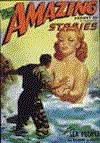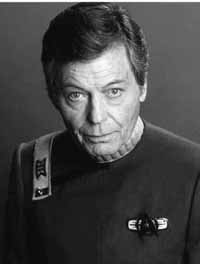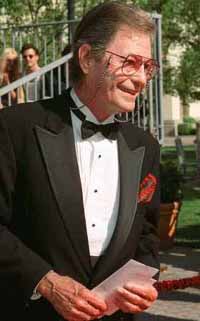|
|
|
DeForest Kelley's epitaph: 'He's dead, Jim' June 17, 1999 By Franklin Harris The announcement of DeForest Kelley's death at 79 shouldn't have been a surprise when it crackled from the radio as I drove home from work last Friday. As numerous stand-up comics had noted, Kelley had looked like his character's nickname, "Bones," for years. And, as the oldest of the original "Star Trek" cast members, Kelley was the logical choice to be the first to go, as a certain pointy-eared Vulcan might observe.
As others have said before, if you add Kirk, Spock and McCoy together, you get one complete human being. What makes "Star Trek" feel like "Star Trek" is the interaction of its three lead characters. Spock and McCoy bounce every episode's ethical dilemma between each other until Kirk finally snatches the ball away and charges the basket. Options are weighed, values considered and actions taken. What goes on in every individual's mind during a time of decision takes place instead among three separate people and becomes a drama for everyone to see. The Kirk/Spock/McCoy triumvirate was a winning formula for Gene Roddenberry, and I remain perplexed as to why he discarded it with "Star Trek: The Next Generation," opting instead for a conflict-free USS Enterprise. There is little drama when everyone on the ship thinks alike.
In the years immediately following "Star Trek's" 1966-69 run on NBC, Kelley starred in only one halfway memorable motion picture, the 1972 B-grade horror flick "Night of the Lepus" -- a movie about giant, man-eating bunny rabbits. (Amazingly, "Night of the Lepus" was never screened on "Mystery Science Theater 3000," although I suspect the MST3K guys simply couldn't get the rights.) If Kelley was bitter, he never let it show in public. He didn't shun the "Star Trek" convention circuit and its legions of Trekkies. And Kelley is the only original series cast member not to have written a tell-all autobiography. (William Shatner's third Trek memoir, "Get a Life!" was just published.) Ironically, the young DeForest Kelley didn't want to be an actor. Instead, Kelley, born on Jan. 20, 1920, in Atlanta, wanted to be a doctor. But the Kelley family's financial situation ruled out medical school, and, while visiting an uncle in Long Beach, Calif., Kelley fell into acting. Soon, a talent scout for Paramount Pictures discovered him, and Paramount signed him to a contract after his return from World War II. Usually, Kelley played the heavy. He appeared as the black-hatted bad guy in numerous westerns, both on television and in the movies.
Eventually, it all led to Roddenberry's casting Kelley as the chief medical officer on the starship Enterprise. Kelley might not be a doctor, but he would play one on TV. And he would play one in the movies as well, starring in the first six Trek feature films. The irascible Dr. McCoy, of course, always got all the best lines. Sure, there are Spock's "Live long and prosper" and Kirk's "Beam me up, Scotty" (which Kirk never actually said), but they can't touch "I'm a doctor, not a bricklayer!" or McCoy's deadpan "He's dead, Jim." Kelley once joked that "He's dead, Jim" would probably be engraved on his tombstone. Now, though, the joke has lost much of its humor. With his fictional death in "Star Trek: Generations," Capt. Kirk passed the torch to the new generation of Star Trekkers. The silver screen now belongs to Capt. Picard and crew. With Kelley and his alter ego gone, it's just as well. Kelley is survived by his wife of 55 years, Carolyn. |

RECENT COLUMNS
Order a helping of Cartoon Network's 'Robot Chicken'
03/31/05
Campaign against video games is political grandstanding
03/24/05
Prize-winning author is 'Wrong About Japan'
03/17/05
Censored book not a good start
03/10/05
Some superhero comics are for 'fanboys' only
03/03/05
'Constantine' does well with its out-of-place hero
02/24/05
'80s publisher First Comics' legacy still felt
02/17/05
Director's cut gives new 'Daredevil' DVD an edge
02/10/05
Put the fun back into 'funnybooks'
02/04/05
Is 'Elektra' the end of the road for Marvel movies?
01/27/05
'House of Flying Daggers' combines martial arts and heart
01/20/05
Anniversary edition of 'Flying Guillotine' has the chops
01/13/05
Movie books still have role in the Internet era
01/06/05
Looking ahead to the good and the bad for 2005
12/30/04
The best and worst of 2004
12/23/04
'Has-been' Shatner is a 'transformed man'
12/16/04
© Copyright 2005 PULP CULTURE PRODUCTIONS
Web site designed by Franklin Harris.
Send feedback to franklin@pulpculture.net.


